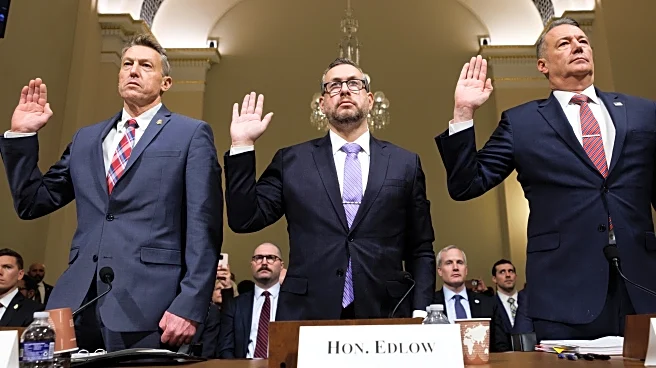What's Happening?
Tata Consultancy Services (TCS), India's largest private-sector employer, has announced a significant reduction in its workforce, cutting 19,755 jobs in the quarter ending September 30. This marks the company's steepest-ever job cuts, driven by strained relations with the US and a rapid shift towards artificial intelligence within the IT services sector. The reduction includes both voluntary departures and terminations, with the workforce falling below 600,000 for the first time since March 2022. TCS is targeting a 2% workforce reduction by March next year, primarily affecting middle and senior-level positions due to skill and capability mismatches. The company has provisioned 11.35 billion rupees for severance costs, and its quarterly profit fell short of expectations due to these job losses.
Why It's Important?
The workforce reduction at TCS underscores the challenges faced by the IT services sector amid geopolitical tensions and technological shifts. The strained US-India relations, including President Trump's curtailment of H-1B visas and tariffs on India, have added pressure on Indian tech companies. These developments coincide with the industry's transition to new technologies like generative AI, necessitating a shift in workforce skills. TCS's move to localize its US workforce and adapt its business model to changing immigration policies highlights the broader impact on employment and economic dynamics in both countries. The job cuts reflect a weak business outlook, affecting high-skilled job creation in India.
What's Next?
TCS plans to continue its workforce reduction strategy, aiming to complete a 2% cut by March next year. The company will focus on hiring individuals with skills relevant to future technologies, adapting to the evolving demands of the IT services industry. As geopolitical tensions persist, TCS and other tech companies may face ongoing challenges in navigating US-India relations and immigration policies. The industry will likely continue to evolve, with companies needing to balance workforce localization and skill development to remain competitive.
Beyond the Headlines
The job cuts at TCS highlight the ethical and economic implications of workforce management in the face of technological advancements and geopolitical shifts. The transition to AI and other emerging technologies raises questions about the future of employment and the need for reskilling workers. Additionally, the geopolitical tensions between the US and India may influence broader trade and economic relations, impacting industries beyond IT services.











